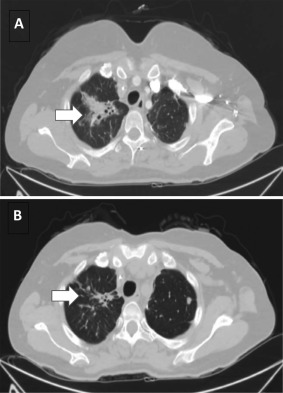Figure 4.

Response of an ERBB2‐amplified metastatic colorectal cancer (mCRC) to antihuman epidermal growth factor receptor 2 (HER2)‐targeted therapy. A 39‐year‐old woman with a pT3N0 rectal adenocarcinoma developed widespread metastatic disease and was treated with systemic chemotherapy and metastasectomies. The mCRC was found to be KRAS wild‐type on routine single‐gene testing and anti‐EGFR therapy with cetuximab was used until disease progression. Comprehensive genomic profiling was performed on a metastasis sample at that time and revealed ERBB2 amplification at 21 copies and a tumor protein p53 (TP53) base substitution. Combination therapy with trastuzumab with a backbone of capecitabine and oxaliplatin was initiated. Treatment with trastuzumab continued for 12 months, after which time the patient's symptoms returned with biomarkers and radiology confirming progressive disease. Representative computed tomography scan image of upper lung metastasis is shown (A) at baseline and (B) after 3 months of trastuzumab and chemotherapy. The arrow indicates significantly regressed tumor burden accounting for improved pulmonary symptoms. The targeted therapy using trastuzumab in combination with cytotoxic chemotherapy maintained a strong response in the patient over a 1‐year course of therapy, reducing tumor burden and improving quality of life.
